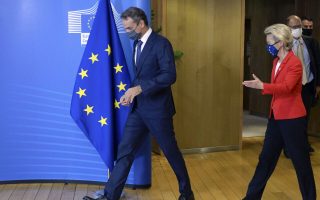Politico: EU Commission backtracks on ‘inclusive language’

The European Commission was forced to perform a U-turn Tuesday after its guide to internal communication was accused of trying to cancel Christmas and launching an attack on “common sense.”
The 30-page guide on how to use more gender-neutral, LGBTQ+ friendly language in the Commission was unveiled by the equality commissioner, Helena Dalli, in late October.
The internal document was picked up on by the Italian tabloid il Giornale, which led to a torrent of abuse on social media as well as from a senior official in the Vatican, far-right politicians and a former EU commissioner.
As a result, Dalli was forced to backtrack. “Concern was raised with regards to some examples provided in the Guidelines on Inclusive Communication, which as is customary with such guidelines, is [a] work in progress,” the Maltese commissioner tweeted. “We are looking into these concerns with the view of addressing them in an updated version of the guidelines.”
The document is part of a plan championed by Commission President Ursula von der Leyen to implement a “Union of Equality” and make sure that “everyone is valued and recognized in all our material regardless of their gender, racial or ethnic origin, religion or belief, disability, age or sexual orientation.”
It asked officials to “never address an audience as ‘ladies and gentlemen’ but use expressions such as ‘Dear colleagues.’” It also called on Commission staffers to refrain from using the terms “Miss or Mrs, unless it is the explicit preference of the person addressed,” and instead to use “Ms universally.”
The most controversial part of the advice was to “avoid assuming that everyone is Christian.”
“Not everyone celebrates the Christian holidays, and not all Christians celebrate them on the same dates,” says the document. It advises staff to avoid sentences such as “Christmas time can be stressful” and instead use “Holiday times can be stressful.”
It also says not to use the phrase “Christian names” and to use “first name” or “forename” instead as well as not using names “that are typically from one religion.” It gives the example of using “Malika and Julio” instead of “Maria and John” to describe an “international couple.”
The guidelines also recommended avoiding the use of “gendered words” such as “man-made fabrics,” which should be replaced with more generic terms such as “synthetic fabrics.”
The guidelines did not go down well. Cardinal Pietro Parolin, the Vatican’s secretary of state and one of the highest officials inside the Holy See, told Vatican News: “Of course, we know that Europe owes its existence and its identity to numerous contributions, but we certainly can’t forget that one of its main contributions, if not the main one, has been Christianity itself.”
The far-right was typically aghast.
“The European Commission, through an internal document, considers the Christmas celebrations as insufficiently inclusive,” Giorgia Meloni, leader of the far-right Brothers of Italy party, wrote on her Facebook page. “In the name of a sinister ideology, it wants to suppress the culture of a people. Our history and our identity can’t be canceled, they must be respected.”
Matteo Salvini, leader of Italy’s right-wing League, echoed Meloni’s criticism. He called the Commission’s guidelines a “folly,” and later mocked its content. “Mary, the mother. John, the father. Long live the holy Christmas … I hope that in Europe, no one will be offended,” he tweeted.
Even a former European commissioner joined in on the attacks. Antonio Tajani, a close ally of former Italian Prime Minister Silvio Berlusconi and one-time president of the European Parliament, said on Twitter: “Long live the Europe of common sense!” after Dalli’s U-turn.
One current Commission official who didn’t want to be named also slammed Dalli and her document. “Commissioner Dalli compensates her total lack of weight in the College [of Commissioners] by pulling out of her hat ‘inclusive guidelines’ which deconstruct the most elementary rules,” the staffer said. “We are going crazy. With Dalli, we are experiencing surrealism.”
The European Parliament and the European Council have both issued similar recommendations to the Commission, but they were less explicit in their examples. In January 2018, the Council issued its guidelines to promote the use of “gender-neutral nouns that make no assumption about whether it is a man or woman who does a particular job or plays a particular role.”
[Politico]





